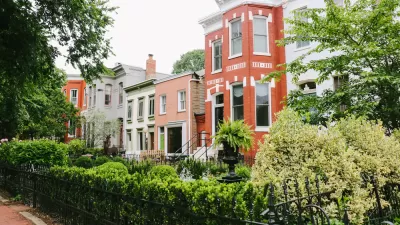California's Senate Bill 9 would allow up to four housing units on lots traditionally zoned for single-family homes, paving the way for more 'gentle density.'

Despite a deepening housing shortage and homelessness crisis, writes Conor Dougherty, California's "State Legislature has struggled to follow their prescription to increase urban density, often because lawmakers fear angering suburban voters, whose preferences for single-family home living have been regarded as politically sacrosanct." This week, the legislature advanced a bill "that would allow two-unit buildings on lots that for generations have been reserved exclusively for single-family homes."
The proposed upzoning, Senate Bill 9, "was furiously opposed by homeowners and local government groups who said it 'crushes single-family zoning' and would be 'the beginning of the end of homeownership in California.'" Toni Atkins, the bill’s author and president pro tem of the California Senate, called it "a gentle density increase that respects the character of neighborhoods" and "will give opportunities to people who haven’t been able to own a home." The bill, which passed the State Senate in May, "made it through the Assembly by a vote of 45-19" and will now go back to the Senate for a concurrence vote.
Reducing or eliminating single-family zoning has been a hot topic in recent years as cities and states struggle to create more affordable housing and keep up with rising demand. "So far only Oregon has passed a state-level ban on single-family house zoning. If California’s S.B. 9 gets final passage and is signed, it would add a state of 40 million to the list."
A second bill passed by the California Assembly this week, SB 10, "would allow local governments to rezone parcels up to 10 units with no environmental review, which would speed development by shrinking the rezoning process by several years." Proponents of statewide zoning reform argue that because "U.S. metropolitan areas operate as a contiguous economy, while their housing markets are fractured by dozens of cities and suburbs that each have their own regulations," more comprehensive state-level policies are crucial to solving the housing affordability crisis.
FULL STORY: After Years of Failure, Lawmakers Pave the Way for More Housing in California

Planetizen Federal Action Tracker
A weekly monitor of how Trump’s orders and actions are impacting planners and planning in America.

Chicago’s Ghost Rails
Just beneath the surface of the modern city lie the remnants of its expansive early 20th-century streetcar system.

San Antonio and Austin are Fusing Into one Massive Megaregion
The region spanning the two central Texas cities is growing fast, posing challenges for local infrastructure and water supplies.

Since Zion's Shuttles Went Electric “The Smog is Gone”
Visitors to Zion National Park can enjoy the canyon via the nation’s first fully electric park shuttle system.

Trump Distributing DOT Safety Funds at 1/10 Rate of Biden
Funds for Safe Streets and other transportation safety and equity programs are being held up by administrative reviews and conflicts with the Trump administration’s priorities.

German Cities Subsidize Taxis for Women Amid Wave of Violence
Free or low-cost taxi rides can help women navigate cities more safely, but critics say the programs don't address the root causes of violence against women.
Urban Design for Planners 1: Software Tools
This six-course series explores essential urban design concepts using open source software and equips planners with the tools they need to participate fully in the urban design process.
Planning for Universal Design
Learn the tools for implementing Universal Design in planning regulations.
planning NEXT
Appalachian Highlands Housing Partners
Mpact (founded as Rail~Volution)
City of Camden Redevelopment Agency
City of Astoria
City of Portland
City of Laramie





























